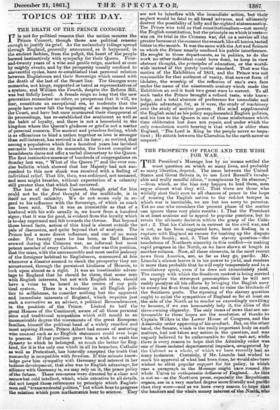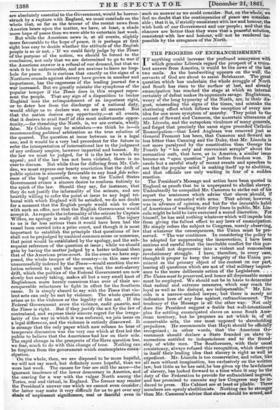THE PROSPECTS OF PEACE .A_ND TEE WISH FOR WAR.
THE President's Message has by no means settled the moot question on which so many lives, and probably so many liberties, depend. The issue between the United States and Great Britain is, to use Lord Russell's invalu- able and really needful idiom, "conspicuous by its absence," —from which, as the bias may happen to lead them, men argue almost what they wilL That there are those who wilfully shut their eyes to all chances of peace in the hope of rousing the English nation to the red-hot temper in which war is inevitable, we are but too sorry to perceive. Yet no one who considers the present phase of the matter can ignore three very plain results : 1. That the President is at least anxious not to appeal to popular passions, but to retain the ultimate decision within the grasp of the Cabi- net; 2. That his Cabinet is in earnest in the civil war, and is not, as has been suggested here, bent on finding in a rupture with England an excuse for hushing up the disputo with the South; and, 3. That the slavery question—the touchstone of Northern sincerity in this conflict—is making rapid progress in the North, as we have shown at length in another column. Now, all these elements, in the most recent news from America, are, so far as they go, pacific. Mr. Lincoln's silence leaves it in his power to yield, and renders it more than probable that he will reply temperately and in a conciliatory spirit, even if he does not immediately yield. The energy with which the Southern contest is being carried on supplies the strongest presumption that he will not rashly paralyze all his efforts by bringing the English navy to sweep his fleet from the seas, and to raise the blockade of the Southern ports. The ripening of the slavery question ought to enlist the sympathies of England so far at least on the side of the North as to render us exceedingly unwilling to become, if we can honourably help it, the allies of the slave-owning oligarchy. The only items of news that are un- favourable to these hopes are the resolution of thanks to Captain Wilkes in the Lower House of Congress, and the Admiralty order approving of his conduct. But, on the other hand, the Senate, which is the really important body on such matters, had not taken any action in the question, and was vaguely believed to be unfavourable to that rash act, while there is every reason to hope that the Admiralty order was one or those isolated departmental impulses, unapproved by the Cabinet as a whole, of which we have recently had so many instances. Certainly, if Mr. Lincoln had wished to mark his approval of what had been done, he would also have wished to elicit popular support for his policy, in which case a paragraph in the Message might have roused the whole Union to enthusiastic defiance of England. As this is not so—as the Northern press, especially the Republican organs, are in a very marked degree more friendly and pacific than they were—and as we have every reason to hope that the bankers and the whale money interest of the North, w40 are absolutely essential to the Government, would be horror- struck by a rupture with England, we must conclude on the whole that, so far as the tenour of the recent news from America bears upon the matter, we have, at least, a shade more hope of peace than we were able to entertain last week. But while the American news is, at all events, slightly more favourable to the hope of peace, it is perhaps at first sight less easy to decide whether the attitude of the English people is so or not. If we could fairly judge by the Times of the purpose of the nation, we should be forced to the conclusion, not only that we are determined to go to war if the American answer is a refusal of our demand, but that we wish it to be unfavourable, and are anxious to leave no loop- hole for peace. It is curious that exactly as the signs of a Northern crusade against slavery have grown in number and importance, has the eagerness of the leading journal for a war increased. But we greatly mistake the symptoms of the popular temper if the Times does in this respect repre- sent the people. That any sign of a disposition to hector England into the relinquishment of an important right, or to deter her from the discharge of a national duty, would oblige us to declare war, we are all assured. But that the nation desires any opportunity,—at all events, that it desires to avail itself of this most unfortunate oppor- tunity,—for thrashing the North, is, we are certain, wholly false. Mr Cobden may be mistaken—we think he is—in recommending political arbitration as the true solution of the quarrel. The question at issue between us is a legal one, and it would be a very bad precedent for the future to refer the interpretation of international law to thp judgment of any ordinary umpire, however impartial and honest. By the law we must be judged, for it is the law to which we appeal; and if the law has not been violated, there is no case to discuss. But while thus far differing from Mr. Cob- den, we must express our hearty conviction that the drift of public opinion is sincerely favourable to any bona fide refer- ence of the legal question, so long as the United States Government evince a sincere desire to conform entirely to the spirit of the law. Should they say, for instance that they, do not justify the informality of the seizure, and are heartily willing to refer the point at issue to any legal tri- bunal with which England will be satisfied, we do not doubt for a moment that the English people would wish to close with such an offer, nor that the English Government would accept it. As regards the informality of the seizure by Captain Wilkes, an apology is really all that is needful. The injury to us is far less serious than it would have been had the vessel been carried into a prize court, and though it is most important to establish the principle that questions of law shall not be prejudged by nautical common sense or nonsense, that point would be established by the apology, and the sub- (serpent reference of the question at issue ; while we should gain by having the matter judged by a better tribunal than that of the American prize-court. In the event we have sup- posed, the whole temper of the country—in this case very unsuccessfully indexed by the Times—would sanction the so- lution referred to ; and the more so, that the anti-slavery drift, which the politics of the Federal Government are now slowly but surely taking, makes all but a very small knot of Englishmen more keenly conscious than ever of their un- conquerable reluctance to fight in effect for the Southern cause. It is simply absurd to say with the Times that vio- lent acts can only be met by violence. The whole question arises as to the violence or the legality of the act. If the Federal Government avow the violence cadit gutestio, and the Times is right. But if they justify the act by the law of contraband, and express their sincere regret for the irregu- larity of the way in which it was enforced, we join issue on a legal difference, and the violence is entirely disavowed. It is strange that the only paper which now refuses to hear of temperate discussion was the very one which at first led the public to believe that the-Americans had law on their side. The rapid change in the prospects of the Slave question has, we fear, much to do with this change of tone. Nothing can be forgiven from the government which contemplates eman- cipation.
On the whole, then, we are disposed to be more hopeful, we will not say much, but definitely more hopeful, than we were last week. The causes for fear are still the same—the ignorant insolence of the lower democracy in America, and the craving for a war with the vulgar North among the Tories, real and virtual, in England. The former may render the President's answer one which we cannot even consider; the latter may make it very difficult for us to get over any shade of unpleasant significance, real or fanciful even in such an answer as we could consider. But, on the whole, we feel no doubt that the contingencies of peace are consider- able ; that it is, if strictly consistent with law and honour, the wish both of our Government and our people ; and that the chances are better than they were that a peaceful solution, consistent with law and honour, will not be rendered im- possible by the arrogance of the North.































 Previous page
Previous page